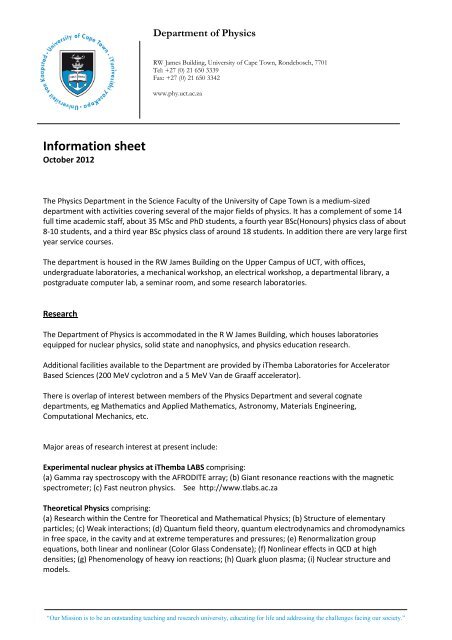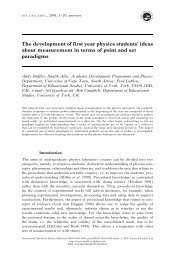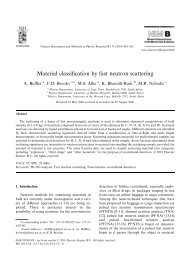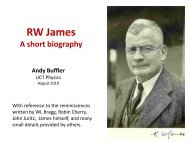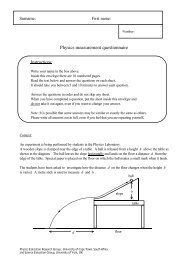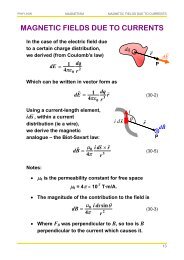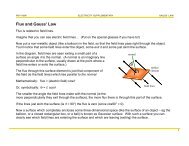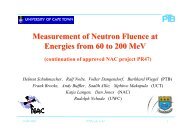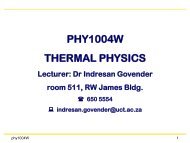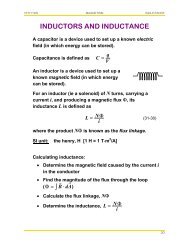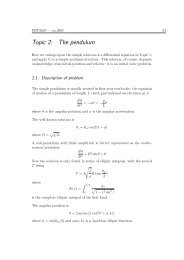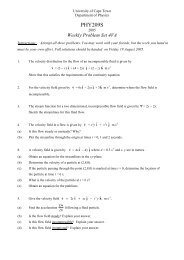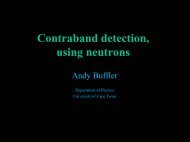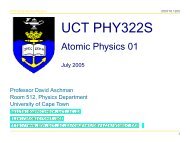Information sheet - University of Cape Town
Information sheet - University of Cape Town
Information sheet - University of Cape Town
Create successful ePaper yourself
Turn your PDF publications into a flip-book with our unique Google optimized e-Paper software.
Department <strong>of</strong> Physics<br />
RW James Building, <strong>University</strong> <strong>of</strong> <strong>Cape</strong> <strong>Town</strong>, Rondebosch, 7701<br />
Tel: +27 (0) 21 650 3339<br />
Fax: +27 (0) 21 650 3342<br />
www.phy.uct.ac.za<br />
<strong>Information</strong> <strong>sheet</strong><br />
October 2012<br />
The Physics Department in the Science Faculty <strong>of</strong> the <strong>University</strong> <strong>of</strong> <strong>Cape</strong> <strong>Town</strong> is a medium-sized<br />
department with activities covering several <strong>of</strong> the major fields <strong>of</strong> physics. It has a complement <strong>of</strong> some 14<br />
full time academic staff, about 35 MSc and PhD students, a fourth year BSc(Honours) physics class <strong>of</strong> about<br />
8-10 students, and a third year BSc physics class <strong>of</strong> around 18 students. In addition there are very large first<br />
year service courses.<br />
The department is housed in the RW James Building on the Upper Campus <strong>of</strong> UCT, with <strong>of</strong>fices,<br />
undergraduate laboratories, a mechanical workshop, an electrical workshop, a departmental library, a<br />
postgraduate computer lab, a seminar room, and some research laboratories.<br />
Research<br />
The Department <strong>of</strong> Physics is accommodated in the R W James Building, which houses laboratories<br />
equipped for nuclear physics, solid state and nanophysics, and physics education research.<br />
Additional facilities available to the Department are provided by iThemba Laboratories for Accelerator<br />
Based Sciences (200 MeV cyclotron and a 5 MeV Van de Graaff accelerator).<br />
There is overlap <strong>of</strong> interest between members <strong>of</strong> the Physics Department and several cognate<br />
departments, eg Mathematics and Applied Mathematics, Astronomy, Materials Engineering,<br />
Computational Mechanics, etc.<br />
Major areas <strong>of</strong> research interest at present include:<br />
Experimental nuclear physics at iThemba LABS comprising:<br />
(a) Gamma ray spectroscopy with the AFRODITE array; (b) Giant resonance reactions with the magnetic<br />
spectrometer; (c) Fast neutron physics. See http://www.tlabs.ac.za<br />
Theoretical Physics comprising:<br />
(a) Research within the Centre for Theoretical and Mathematical Physics; (b) Structure <strong>of</strong> elementary<br />
particles; (c) Weak interactions; (d) Quantum field theory, quantum electrodynamics and chromodynamics<br />
in free space, in the cavity and at extreme temperatures and pressures; (e) Renormalization group<br />
equations, both linear and nonlinear (Color Glass Condensate); (f) Nonlinear effects in QCD at high<br />
densities; (g) Phenomenology <strong>of</strong> heavy ion reactions; (h) Quark gluon plasma; (i) Nuclear structure and<br />
models.<br />
“Our Mission is to be an outstanding teaching and research university, educating for life and addressing the challenges facing our society.”
Experimental high energy physics, comprising:<br />
(a) Research within the UCT-CERN Research Centre; (b) Relativistic heavy ion collisions within the ALICE<br />
collaboration at CERN; (c) High energy proton-proton collisions within the ATLAS collaboration at CERN.<br />
Nanophysics and solid state physics comprising:<br />
(a) Research within the Nanosciences Innovation Centre; (b) Structural and electrical properties <strong>of</strong> thin<br />
films; (c) X-ray diffraction studies <strong>of</strong> strain fields and residual stress analysis; (d) Single electron transport<br />
and interactions.<br />
Applied Physics comprising:<br />
(a) Positron Emission Particle Tracking at PEPT <strong>Cape</strong> <strong>Town</strong>, iThemba LABS; (b) Particulate flow and<br />
interaction characterization in engineering and biological systems by computational and mechanistic<br />
modelling; (c) Radiation transport modelling in industrial and medical systems; (d) Applied nuclear physics<br />
using neutrons; (e) Geo-neutrino detection (EARTH collaboration).<br />
Tertiary physics education comprising:<br />
(a) Curriculum design and evaluation; (b) Role <strong>of</strong> language; (c) Understanding <strong>of</strong> measurement and<br />
uncertainty; (d) Modelling and visualization.<br />
The opportunities that the Square Kilometre Array might provide the department are also recognised. The<br />
independent Department <strong>of</strong> Astronomy are neighbours in the RW James Building.<br />
Research funding may be applied for from university sources and from the National Research Foundation<br />
(NRF) <strong>of</strong> South Africa. Academics are strongly encouraged to apply for an NRF research rating which<br />
provides automatic basic funding to be awarded. Funding is also available for ATLAS and ALICE researchers<br />
through the SA-CERN programme. See http://www.sa-cern.ac.za/<br />
Teaching<br />
Undergraduate teaching<br />
The department teaches Physics in a curriculum which leads to a major in Physics in the three year BSc<br />
degree. There are large first year service courses where Physics is taught to engineering, medical and other<br />
non-physics students. An average teaching load is around 90 lectures a year, ranging from first year courses<br />
to honours level courses. In addition, usually one afternoon a week will be assigned to supervising<br />
laboratory activities. All staff, both experimentalists and theorists, will be expected to supervise first year<br />
laboratory classes, where graduate students act as the demonstrators and tutors. Usually the<br />
experimentalists run the senior undergraduate laboratories.<br />
Honours teaching and project supervision<br />
Students may go on to take physics in the one year BSc (Honours) degree, which follows the 3 year BSc<br />
degree. This course contains a research project which a student completes under supervision <strong>of</strong> a member<br />
<strong>of</strong> the Physics staff. The level <strong>of</strong> the coursework in the Honours degree is similar to that in the first year in a<br />
graduate school programme in Physics in the United States.<br />
Post-graduate (MSc and PhD) supervision<br />
Staff members are encouraged to supervise postgraduate students at both MSc and PhD level. The average<br />
number <strong>of</strong> post grads per staff member is around four.<br />
Administration<br />
All academics share in some <strong>of</strong> the administrative load <strong>of</strong> the department, supported by a departmental<br />
administrator and two senior secretaries. A set <strong>of</strong> portfolios has also been designed to provide academics<br />
with opportunities to contribute positively to the operations <strong>of</strong> the department.
Leave<br />
Academic members <strong>of</strong> staff are afforded opportunities <strong>of</strong> taking research leave <strong>of</strong> different types. It is<br />
reasonably straightforward to travel overseas for extended periods (6 weeks or more) during the June/July<br />
vacation. Annual leave is generally taken in January (summer).<br />
See http://hr.uct.ac.za/service/academic/leave/apply/<br />
Faculty <strong>of</strong> Science<br />
The Faculty <strong>of</strong> Science enjoys a high national and international reputation for the quality <strong>of</strong> its teaching,<br />
research and outreach programmes. It comprises thirteen departments: Archaeology, Astronomy, Botany,<br />
Chemistry, Computer Science, Environmental and Geographical Science, Geological Sciences, Mathematics<br />
and Applied Mathematics, Molecular and Cellular Biology, Oceanography, Physics, Statistical Sciences,<br />
Zoology.<br />
The first degree is a BSc (minimum time 3 years), for which students will need to choose at least two<br />
majors. Some students choose to continue to a one year BSc(Honours) degree before potentially embarking<br />
on an MSc (nominal time 2 years), followed by a PhD (nominal time 3 years). Masters programmes may be<br />
by thesis only, or by coursework and thesis. Examination <strong>of</strong> the PhD degree is by dissertation only.<br />
The BSc is characterised by its coherence, a good balance between breadth and depth, the development <strong>of</strong><br />
pr<strong>of</strong>essional and other skills that are relevant in the labour market, and an interdisciplinary nature. In<br />
addition, there are routes through the BSc for students whose schooling backgrounds may be characterised<br />
as having significant educational disadvantage. The Faculty has an extensive service teaching obligation and<br />
large numbers <strong>of</strong> students from the Faculties <strong>of</strong> Commerce, and Engineering and the Built Environment are<br />
enrolled for courses in the Science Faculty. Smaller numbers <strong>of</strong> students from the Faculties <strong>of</strong> Health<br />
Sciences and Humanities are also enrolled for courses in Science.<br />
The Science Faculty has approximately 2 700 students. Some 25% <strong>of</strong> these are enrolled in Masters and<br />
Doctoral programmes. Among all UCT students registered for the PhD degree, almost 30% are registered in<br />
the Science Faculty. The Faculty has planned for slow and relatively small growth <strong>of</strong> its enrolments overall,<br />
and for an increase in the proportion <strong>of</strong> postgraduate enrolments in the medium term to at least a third <strong>of</strong><br />
the total.<br />
The student body is cosmopolitan, and is drawn from all regions in South Africa, from elsewhere in Africa,<br />
and from other parts <strong>of</strong> the world.<br />
The Faculty is well placed to contribute substantially to our institutional goal <strong>of</strong> becoming a research-led<br />
university. It enjoys a high national and international reputation for the excellence <strong>of</strong> its research<br />
programmes. Almost 75% <strong>of</strong> the approximately 160 full-time permanent academic staff in the Faculty have<br />
current National Research Foundation ratings which is the highest <strong>of</strong> all South African university science<br />
faculties. In addition, a high proportion <strong>of</strong> our academic staff enjoy considerable international recognition<br />
for the quality <strong>of</strong> their research and scholarship, and almost 90% <strong>of</strong> all academic staff in the Science Faculty<br />
hold PhD degrees. The average annual rate <strong>of</strong> publication in the peer-reviewed literature exceeds three per<br />
staff member.<br />
For more information email the Head <strong>of</strong> Department, Pr<strong>of</strong>essor Andy Buffler (andy.buffler@uct.ac.za)


